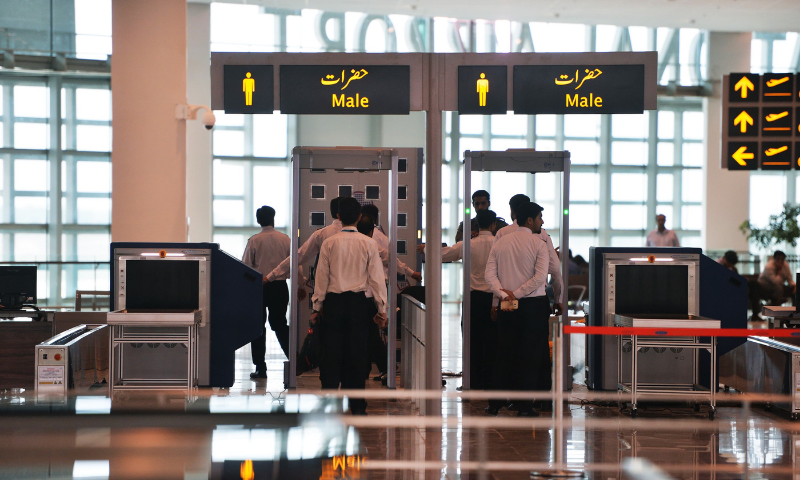Pakistan begins random Covid testing of inbound travellers at airports

The National Institute of Health (NIH) on Sunday decided to increase the scope of the ongoing Rapid Antigen Tests (RAT) of inbound travellers at international airports across the country in view of the global coronavirus situation, it said in a statement.
The National Institute of Health (NIH) on Sunday decided to increase the scope of the ongoing Rapid Antigen Tests (RAT) of inbound travellers at international airports across the country in view of the global coronavirus situation, it said in a statement.
In a series of tweets today, the institute — which has been heading Pakistan's Covid-19 response after the National Command and Operation Centre (NCOC) was formally shut down — said that RATs were being conducted on a random basis as a measure to monitor Covid-19 activity. "After reviewing the recent global situation of Covid-19, and the directive of the Federal Minister Health, CDC, NIH has advised CHE (Central Health Establishment) to increase the scope of existing ongoing RATs for Covid-19 at international airports in a systematic way, for passengers from different countries," it stated. NIH added that the main aim of the decision was to remain vigilant and conduct surveillance and monitoring at entry points to rapidly detect any infected case.
Random screening of travellers arriving from Gulf states and Saudi Arabia began at Karachi, Lahore and Islamabad airports yesterday. According to the Civil Aviation Authority (CAA), RAT would now be conducted at the three airports for all inbound flights from the Gulf countries and Saudi Arabia as per proportion.
Initially, Rapid Antigen Test of 10 to 15 passengers arriving on planes having 150 seats and between 15 and 20 travellers arriving on aircraft with minimum capacity of 250 seats will be conducted, the CAA spokesman said.
The measures, he added, were being implemented in light of the health ministry's advice and would remain in effect until further notice.
First case of Omicron sub-variant detected in Pakistan
The development comes after the first case of the Omicron sub-variant BA.2.12.1 was detected in Pakistan earlier this month.
On May 9, it was reported in a man who had arrived in Islamabad from a foreign country and had tested positive at the airport, an official of the Ministry of National Health Services told Dawn. All those whom the person came in contact with have been quarantined.
The health ministry official said the patient tested positive at the airport and later, during genome sequencing, it was confirmed that he was infected with the new variant. “We have decided not to mention the name of the country from where the patient had travelled to Pakistan. However, the new variant has been continuously spreading in different countries. The patient is feeling well and all his contacts have been quarantined at their home,” he said.
“Although the variant is more transmissible, the good thing is that all the vaccines are effective against it. So we request the masses to get themselves vaccinated at the earliest and those who have been vaccinated, should get their booster shots,” he cautioned.
The new Omicron sub-variant is a descendant of the earlier super-contagious "stealth Omicron" and has quickly gained ground in the United States.
BA.2.12.1 was responsible for 29 per cent of new US Covid-19 infections in April's third week, according to data reported by the US Centers for Disease Control and Prevention. And it caused 58pc of reported infections in the New York region. The variant has been detected in at least 13 other countries, but the US has the highest levels of it so far. Scientists say it spreads even faster than stealth Omicron.
Following the detection of the Omicron sub-variant, Prime Minister Shehbaz Sharif ordered the immediate restoration of the NCOC which was formed by the PTI government in March 2020 to oversee its response to the coronavirus pandemic. It was dissolved earlier this year in April after Covid cases in the country subsided.
According to NIH data, 84 new cases of the virus were reported across the country in the last 24 hours and the positivity rate was 0.48 per cent. As many as 109 patients were receiving critical care.